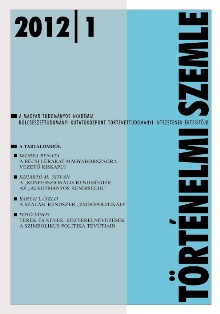A „konfesszionális rendiségtõl” az „alkotmányos rendiségig”. Lehetõségek és feladatok a 18. századi magyar rendiség kutatásában
From “Confessional Corporatism” to “Constitutional Corporatism”. Possibilities and Tasks in the Research of Hungarian Corporatism in the 18th Century
Author(s): István Szijártó M.Subject(s): History
Published by: Magyar Tudományos Akadémia Bölcsészettudományi Kutatóközpont Történettudományi Intézet
Summary/Abstract: The aim of the present article is to identify the possible priorities in the research of Hungarian political life in the 18th century for the coming years. In order to do this, the author at first gives a survey of recent historiography and research results, and then places alongside the now traditional series of questions of social history another set of questions which emerge from the different approaches of cultural history. Basically the question to which the answer is sought is how political history should be written in the 21th century. From the survey of Hungarian and international research on the early modern Hungarian estates, which in recent years has been revived, linking institutional and social history appears to be a promising direction, completing prosopography by a thorough exploration and examination of individual careers. Similarly promising may be setting up a generative model of political behaviour following Fredrik Barth, and a microhistorical analysis, which attempts to answer the main questions of the estates and political life in the 18th century examining a single episode or the events of one day. As for the theories frequently cited by the various branches of cultural history, and in the debates of the philosophy of history during the past few decades, we suggest, following Simmel, Dewey and Cassirer, a concentration on relations, whereas in the wake of the history of concepts and discourses, an analysis of the texts, the language and the whole discourse of politics can be attempted, completed, perhaps, by an analysis of offensive political poetry, following Bakhtin. We can also say that having revealed institutional structures and certain structures shaped by social developments when completing an institutional history of the Diet, the next thing to be done is the exploration of the practices which formed the structures; this process, on the other hand, will make it possible to identify new structures of social history. Then, other analyses of cultural history can be done, which will bring us closer to understandig the experiences of historical actors as well as how they themselves interpreted what happened to them. Finally, the analysis might be completed by an attempt at microhistory. For microhistory, through the exploration of a well-defined object of research, is able both to give the explanations of social history and to grasp the meanings of cultural history; on the one hand, it presents the experiences of historical actors and the ways how they looked upon their own world; on the other, by a retrospective analysis, it can reveal some deep historical structures, which, of course, could be absent from the interpretations of the contemporaries themselves. The questions of the estates and the political life of 18th-century Hungary accompany the entire argumentation of the study as illustrations.
Journal: Történelmi Szemle
- Issue Year: 2012
- Issue No: 01
- Page Range: 37-62
- Page Count: 26
- Language: Hungarian

